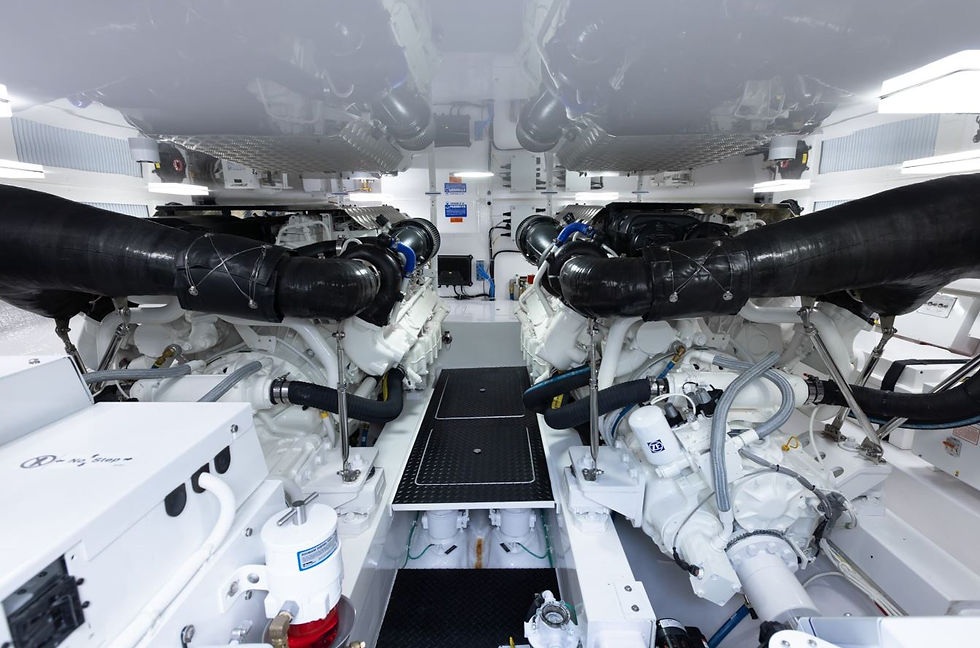

Nov 26, 2025


Nov 19, 2025


Viking Yachts partnered with Scania, makers of industrial and recreational diesel engines, to showcase the capability of renewable diesel fuel power systems at a demonstration in Atlantic City.
The demo used the boat Mack Attack, a 48-foot Viking Convertible sportfishing yacht, powered with twin Scania 1150 horsepower DI 16-liter V8 engines.
The vessel was fueled using RD99, a renewable diesel fuel that's composed of 99% "renewable feedstocks" like cooking oil.
“Sustainability continues to remain at the core of Scania’s business strategy as part of our response to the global climate crisis,” said Jorg Franzke, President of Scania USA in a press release.
According to the company, the DI16-liter diesel engine is built on a "Compacted Graphite Iron (CGI) engine block" and employs a simple wastegate turbocharger. The engine also utilizes Scania’s proprietary Engine Management System (EMS) and common rail extra high-pressure injection system (XPI), for optimal fuel delivery while creating high torque and lower noise.

“While renewable fuel has been a proven solution for our marine engines since 2011, this demonstration marks the next step in showing the world the incredible results of the combination of RD99 fuel and Scania powerplants. We’re grateful to the shared commitment to next-generation, sustainable solutions on the water from our partners at Viking for the opportunity to bring boating further into the future.”

When Viking and Scania first began testing Mack Attack last year, Patrick McGovern, CEO and President, Mack Boring & Parts Co said “The Viking 48C may be the largest 48-foot Convertible out there, and the ability of the Scania engines to accelerate her onto plane quickly has exceeded expectations, while the cruise and top speed are great in a boat of this class. Once again, we are showing the yachting customers that Scania engines from 700-1,150 HP offer a new and improved option for their diesel engine selection backed by global support and a local distributor with over 100 years’ experience.”
The RD99 fuel is described as being chemically akin to traditional diesel, but can serve as a direct replacement, thus requiring no modifications or retrofitting to an existing engine and fuel system. Depending on the feedstock sources and the production method, Scania and Viking believe RD99 fuels can reduce greenhouse gas (GHG) emissions by up to 90% compared to standard diesel. Going forward, all Scania marine engines will be compatible with RD99 fuel.
The event in Atlantic City was a joint presentation by Mack Boring CEO Patrick McGovern and John DePersenaire, Director of Government Affairs and Sustainability at Viking Yachts. After the sea trial, a Q&A session was held aboard Mack Attack.

“The performance of the Scania V8 engines on RD99 was seamless,” said McGovern at the event. “This demonstration confirms that renewable diesel is not just a theoretical solution, it’s a practical one. We’re proud to work with Viking on initiatives that drive real environmental progress in the marine sector.”
“Viking has long supported renewable diesel as the leading solution to reduce emissions in recreational boating,” added Viking President and CEO Pat Healey. “The industry is reaching the same conclusion, supported by independent research and real-world testing like this.”
Performance figures in September 2024 showed the Viking/Scania configuration as impressive, even before the latest iteration was launched. At low speeds of 9.7 knots (engine speed 800), the vessel had a combined fuel burn of 10 gal. At its maximum 38 knots (engine speed 2300), it had a combined fuel burn of 120 gal. At a cruising speed of 24.4 knots (engine speed 1700), the vessel had a combined fuel burn of 68 gallons, figures that are all on-par with traditional diesel fuel in the same setup.






Comments